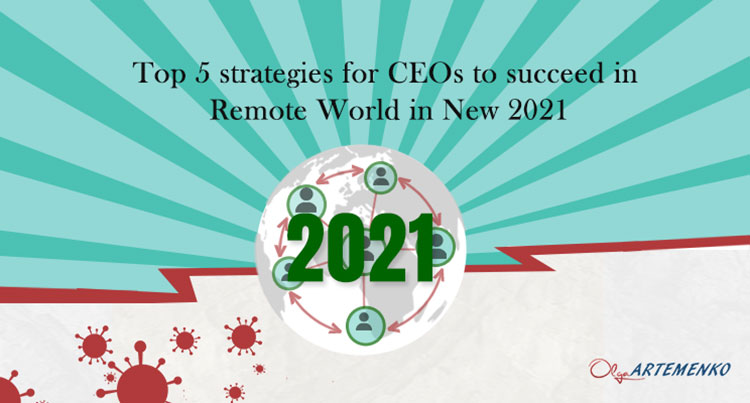What CEOs can do to succeed in the 2021 remote world

Covid 19 impacted the world forever. Businesses are pressured to function in the modern virtual world. They often employed talents from around the world and their operations progressively grew to be global.
The remote world is getting more sophisticated every day. What CEOs can do today to be ready for 2021?
Here are the top 5 strategies that will help you to lead your business to your future success.
- Invest in the right technology
Develop an interest in technology
For a virtual leader is largely important to be well equipped in technology. A smart selection of the best appropriate technology for the business will help your remote team with communication. Team members can speak to each other in interactive chat systems, along with coordinating their work more centrally.– Choose the best: Think about the right methods for networking and teamwork and select what is best for the company.
– Set up a CRM (Customer Relationship Management): A collaborative CRM, with all the data stored conveniently can help many individuals to focus on the same mission from multiple places.
– Provide interactive display: The latest immersive display makes work for remote teams much easier and it can be conveniently linked between devices. Display can also be used to show suggestions and workshops, and virtual employees can be seen on their own phones. - Use collaborative software
Maximize your tools
Continuing connectivity and teamwork are among the greatest obstacles facing interactive teams. Without it, teams will not be able to guarantee that any scattered worker is on board, and virtual peers will not be able to establish genuine, trusted relationships. One of the core concepts of strong leadership of virtual teams is effective use of interactive software. Although unique applications and frameworks are evolving over time, organizations should continue to invest in connectivity, communication, cloud sharing, and project management software. Meetings and video conferencing are critical when it applies to interactive work teams.Various applications that are great to use include:
– Google Hangouts: It can hold meetings of up to 15 participants, ideal for teams that are all interactive.
– Skype: It is common for video conferencing and can be used for up to 25 people.
– Google Drive: It is a common file-sharing application. A community of users can open the folder and attach documents and images to it.
– Dropbox: It is primarily used to exchange high-quality images and various documents.
– Trello: This app is popular among freelancers and businesses and provides quick and clear arrangement of activities. - Train the employees
Foster continuous learning
Because your workers cannot wander around your desk and see if you are ready for a short chat, you need to prove that you are with them in other respects. You cannot assume that someone who is a good worker will automatically be successful as a remote employee. Your business will have to adjust its practices to capture potential productivity gains from remote work.As an employer you need to establish training of employees to work remotely. Training your employees will prepare them to adapt to a virtual environment and give them an opportunity to learn continuously. You must ensure that work tasks are well received, and your employees are effective and engaging. Preparation of your remote workforce will require some time and investment. However, in result your initiatives will reap the benefits.
- Establish realistic expectations for your team
Improve transparency
Transparent management is the secret to creating a community of trust between CEOs and their team. Team members who stay in the flow and recognize their position in the broader mission and priorities of the organization are more probable to place their faith in their supervisor.– Build a pleasant atmosphere: Encourage a work culture without distraction inside your virtual environment.
– Foster openness: Nurture an open discussion on priorities and development.
– Cross multiple networks: Maximize your performance with different contact strategies whether critical or day-to-day. - Motivate your company by example
Make your people feel supported
Motivating face to face is challenging enough. It is much more difficult to do it online. Most of the CEO’s role is to inspire and to successfully encourage to understand what team members appreciate. At a basic level, it can be a matter of motivating those with ongoing dedication by creating exciting tasks, time off, on-line group sessions, or providing resources for collaboration.There are different factors that you need to achieve to be a perfect virtual leader. You need to be optimistic, inspired, to allow bad results to happen, and to continue to pass on a feeling of hope to teammates. This will greatly increase the productivity of the employee and eventually build the great future of your company in the virtual universe.
Conclusion
In 2021, according to Upwork’s “Future of Workforce Pulse Report” 1 in 4 Americans will be working remotely.
Progressing with remote work will require you to utilize many shifts, such as investment in digital infrastructure and training remote workforce. Additionally, your business has to create a new culture to reduce an emotional stress among remote employees from isolation and to promote wellbeing.
All innovations could be challenging at the beginning. But with time you will get a good sense of how to operate your business in a new environment effectively.
Lead your business confidently and plan it wisely to succeed in 2021 and beyond.
If you enjoy this article, don’t forget to check out our compilation of the World’s Richest Race Car Drivers, Richest Musicians, Richest Models, and Richest Rappers Richest Hockey Players Richest Film Directors.
Add CEOWORLD magazine to your Google News feed.
Follow CEOWORLD magazine headlines on: Google News, LinkedIn, Twitter, and Facebook.
This report/news/ranking/statistics has been prepared only for general guidance on matters of interest and does not constitute professional advice. You should not act upon the information contained in this publication without obtaining specific professional advice. No representation or warranty (express or implied) is given as to the accuracy or completeness of the information contained in this publication, and, to the extent permitted by law, CEOWORLD magazine does not accept or assume any liability, responsibility or duty of care for any consequences of you or anyone else acting, or refraining to act, in reliance on the information contained in this publication or for any decision based on it.
Copyright 2024 The CEOWORLD magazine. All rights reserved. This material (and any extract from it) must not be copied, redistributed or placed on any website, without CEOWORLD magazine' prior written consent. For media queries, please contact: info@ceoworld.biz
SUBSCRIBE NEWSLETTER









